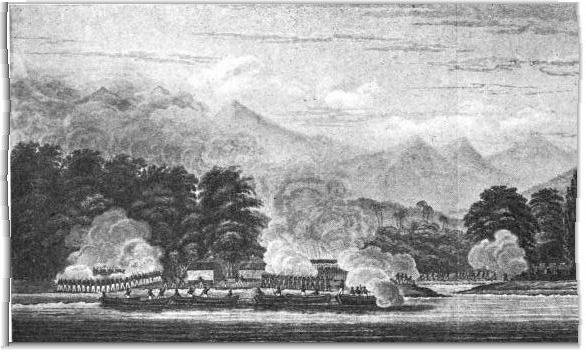US Marine First Warfare in Southeast Asia
BLANGPIDIE - Kuala Batu, now part of Kuala Batee Sub-district, Southwest Aceh Regency (Abdya), is one of the areas that holds the history of glory, as well as the heroism of the Acehnese.
The kingdom of Kuala Batu, which ruled around 1785 - 1832 AD, is now included in the territory of Kuala Batee Sub-District bordering Susoh Sub-District, Aceh Barat Daya District.
Although it has a small territory, but the name of Kuala Batu had made the United States in 1832, when several crew of American cargo ships massacred by residents in the region.
US President Andrew Jackson sent a USS Potomac warship under Commodore John Downes to punish the inhabitants of Kuala Batee for the incident.
The attack on Kuala Batu is the first US Navy in Southeast Asia. In carrying out its mission to Kuala Batu, USS Potomac which is the forerunner of the United States aircraft carriers, carrying a number of naval officers and hundreds of marines.
In the fighting in Kuala Batu, the United States Navy got fierce opposition from the local population.
This incident took hundreds of lives of soldiers of Kuala Batee and local residents. While on the US side, only 2 people were killed with 11 other skippers and marines injured.
After engaging in the struggle at Kuala Batee, Potomac traveled twice to the Brazil Squadron to protect US interests in Latin America (October 20, 1834-5 March 1837 and 12 May 1840-31 July 1842).
Between December 8, 1844-4 December 1845, Potomac meronda West Indies, and again patronized in the Caribbean between the date of 14 March 1846-20 July 1847.
During the last period, Potomac landed in Port Isabel, Texas, on May 8, 1846 to transport the army led by Jend. Zachary Taylor in the Battle of Palo Alto.
Potomac also participated in the siege of Veracruz between 9-28 March 1847.
This event at once became the beginning of the end of the power of the Kingdom of Kuala Batu, which was once famous as a producer of spices, the best on the island of Sumatra.
The intense battles between the United States Navy and the warriors and residents of the Kingdom of Kuala Batu are listed in numerous treatises and books written by American and European historians.
Among them in the book entitled "The scents of Eden: a history of the spice trade" written by Charles Corn (1999).
"Thence round Cape Horn" by Robert Erwin Johnson, (1980), "American lion: Andrew Jackson in the White House" by Jon Meacham (2008), and "Cruise of the United States frigate Potomac round the world: during the years 1831 -34, "written by Francis Warriner (1835).
In addition to the note in the book, in Kuala Batee there is still some evidence that led to the existence of the Kingdom of Kuala Batu in the past, as well as evidence of a battle between the United States Navy with the royal soldiers and residents of Kuala Batu.
Among the evidence is seen from an English inscription that is now stuck in front of the primary school in Gampong Lama Tuha, Kuala Batee, Aceh Barat Daya.
According to some residents, this inscription was originally buried in one of the fort (Madat) scattered in the region.
There is only one inscription and several areas of Madat (a mound of land that was once a bastion of defense) remained in the region adjacent to the Indian Ocean.
Some young people who met at the site also claimed not to know the exact history of the Kingdom of Kuala Batu and the battle with the United States Navy.
They only know that in the areas of Madat is often found cannons, ancient coins, ceramics, and other historical items.
Local people also hope to the Government of Indonesia, Aceh, and West Aceh regency government, to immediately pave the way to their village and relocate the historical sites, so that no more lost in the era.

Hi! I am a robot. I just upvoted you! I found similar content that readers might be interested in:
http://wikivisually.com/wiki/John_Downes_(naval_officer)
owh that is impossible, I write it myself, maybe by chance it is a bit same @cheetah